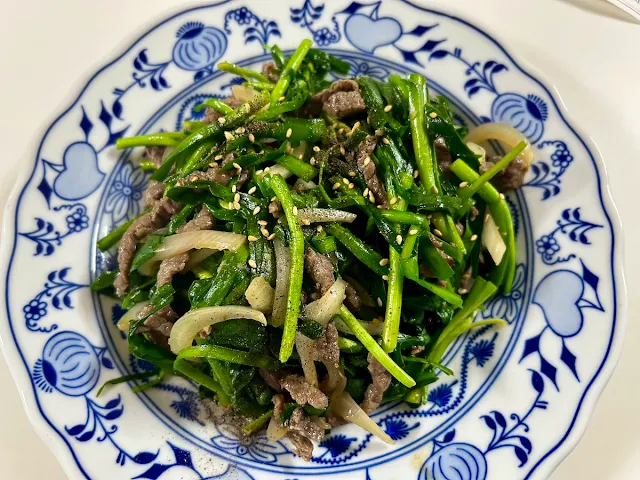Buchu Japchae (Korean Garlic Chive Stir-Fry): A Simple and Tasty Spring Dish
 |
| Buchu Japchae |
Buchu, or Korean garlic chives (부추), are flavorful, tender, and packed with nutrients. This quick stir-fry with buchu, pork, and onion is a spring favorite in Korea—and once you try it, you’ll see why.
Ready to give it a try?
Ingredients and Preparation
All you need are garlic chives (buchu, 부추), a little meat, and an onion. Simple and satisfying!
Ingredients
About half a bunch of garlic chives (buchu, 부추)
150g of thinly sliced pork or beef (돼지고기 또는 소고기)
1 onion (양파)
1 tsp minced garlic (다진 마늘)
3 tsp soy sauce (간장)
2 tsp oyster sauce (굴소스)
A pinch of black pepper (후추)
1 tsp sugar (설탕, 또는 다른 감미료)
Olive oil (올리브유, 또는 식용유)
A drizzle of sesame oil (참기름)
Sesame seeds for garnish (참깨)
Use pre-cut, thinly sliced meat for convenience—it saves time and keeps your cutting board clean. Feel free to adjust the amount of chives to your liking.
How to Make It
Season the meat Cut the meat into long, thin strips. Add garlic, 2 tsp soy sauce, and 1 tsp sugar. Mix well with your hands until evenly coated.
Season the Meat Prepare the vegetables Wash the garlic chives (buchu) and cut them into 3–4 cm (1–1.5 inch) pieces. Scrub the root ends well—they often hold dirt. Slice the onion thinly so it cooks at the same pace as the meat.
Prepare the Buchu Stir-fry Heat some oil in a deep pan. Add the marinated meat and sliced onions. Stir-fry over medium heat for 3–5 minutes.
Add the remaining 1 tsp of soy sauce and the oyster sauce during cooking.
Stir-fry Add the chives When the meat and onions are fully cooked, add the chives (buchu) just before turning off the heat. Stir gently and briefly—overcooking can cause the chives to lose their flavor and become limp.
Add the Buchu Finish and serve Turn off the heat. Add a drizzle of sesame oil and a pinch of pepper. Mix gently and plate. Sprinkle sesame seeds on top just before serving.
Finish and Serve
That’s it—quick, delicious, and full of spring flavor!
Why Pork Works So Well with Buchu
Regular japchae with noodles usually uses beef, but pork is perfect for this dish. Buchu and pork are a classic Korean pairing. Why? Let’s take a look.
Pork is rich in protein and essential nutrients. Interestingly, the BBC once ranked pork fat as one of the world’s top 10 superfoods! I used to avoid fatty meat because of a sensitive stomach, but now I enjoy it in moderation—for both taste and health.
In traditional Korean medicine, pork is thought to have a cooling nature. People with a “cold constitution” may find it harder to digest. Buchu, on the other hand, has a warming nature—so when paired with pork, it balances the body and supports better digestion.
That’s why buchu japchae isn’t just delicious—it’s also a nutritionally smart dish. This is the same reason why buchu is often served with Jeyuk Bossam (제육보쌈, Korean boiled pork wrap).
Why Is Buchu Japchae a Spring Delicacy?
You can find garlic chives (buchu) year-round at the store or even grow them at home. But the best time to enjoy them? Spring.
Chives that grow during mild spring weather are soft, fresh, and easy to eat. As the weather gets hotter, they grow faster—and become tougher and harder to chew.
Traditionally, Koreans enjoyed buchu japchae before Dano (단오, the 5th day of the 5th lunar month), a Korean seasonal festival. After Dano, people would switch to spicy japchae with chili peppers instead. Even today, eating seasonally brings out the best flavors—especially in Korean cooking.
Related Reads
#BuchuJapchae #KoreanRecipes #GarlicChives #SpringFood #EasyKoreanCooking #





Comments
Post a Comment